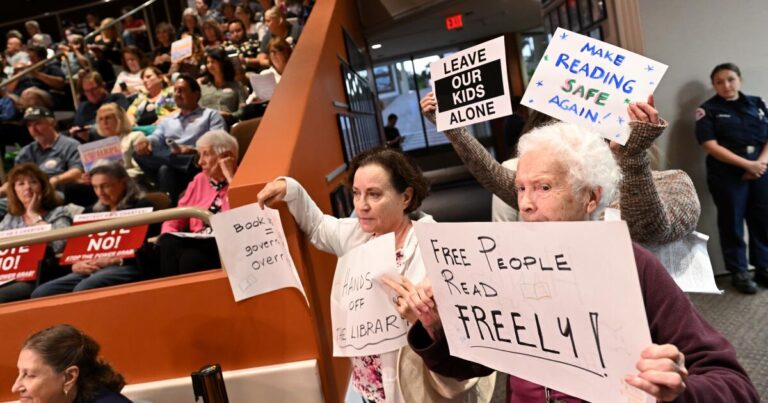Beginning now, a panel of 21 designated residents will display all new books for sexual content material heading into the youngsters’s and teenage sections of the Huntington Seashore Public Library, in addition to evaluation these already on the cabinets. Supporters of this new regime, together with Mayor Professional Tem Gracey Van Der Mark, who first steered the panel, loudly proclaim that this isn’t a e-book ban.
Do not consider them.
Sure, it’s true that no books at the moment on town’s library cabinets will likely be eliminated by the residents’ panel as a result of they include references to intercourse. (Nobody expressed concern about racist or different doubtlessly problematic content material.) Some books could also be transferred from the youngsters’s or teen part to the grownup part, and fogeys might approve an all-access library card to permit their kids to make use of these supplies and not using a guardian current. .
However what’s most troubling about this new system, authorised by town council on October 17, is that this panel of e-book judges, who might don’t have any experience in literature or librarianship, may have the facility to dam the library from shopping for new books they price. inappropriate.
And the panel’s moralistic selections is not going to solely have an effect on younger readers. A 2012 examine discovered that greater than half of the purchases of younger grownup books geared towards the 12- to 17-year-old set are made by adults. And most of them do not buy the books for the youngsters of their lives, however to learn themselves. However adults will not have the ability to learn them if the panel decides to not purchase them.
Giving residents censorship rights over librarians and the general public crosses a transparent line that ought to by no means be crossed.
Van Der Mark justified the panel by arguing that librarians make these selections on a regular basis. Truthful level. However librarians are professionals who’ve undergone intensive coaching to know the that means of obscenity, which isn’t protected by the first Modification. Beneath the US Supreme Courtroom’s 1973 Miller ruling, which stays the authorized commonplace for obscenity, it isn’t sufficient {that a} e-book or speech incorporates graphic sexual content material; throughout the framework of the complete work, it should even be with out critical literary, inventive, political or scientific worth.
It is a resolution for consultants to make. Neighbors shouldn’t forestall neighbors from having books obtainable at their native library.
The Huntington Seashore library buys 9,000 books a month for kids and youths. It has been left unclear whether or not the panel will take a critical take a look at 9,000 books every month. If even only a tenth of these could possibly be value scanning for potential sexual content material, that is nonetheless 900 books a month. It’s not cheap to count on panelists to present everybody an intensive and truthful studying. It is laborious sufficient for many of us to complete the studying our e-book membership has chosen that month.
Van Der Mark says the panel will use the identical assets — e-book evaluation catalogs and so forth — that librarians use, since even the consultants cannot presumably learn that many books every month. However librarians do not scan books for sexual content material, which the panel needs to do. That is – or definitely must be – a extra sophisticated job than Van Der Mark and her allies might have thought-about.
There’s extra room for debate in relation to inserting books for very younger kids in a restricted part. It’s an age the place parental management performs a higher position within the alternative of books.
However it’s straightforward to see that makes an attempt to regulate the youth division are problematic and easily impractical. In that part, dad and mom who’re extra averse to sexual content material might object to books that, for instance, present some graphic illustrations when explaining methods for protected intercourse. These dad and mom must be conscious that, regardless of their very own beliefs, their kids might have that info, and are particularly unlikely to ask dad and mom who they know will react badly.
Moreover, what could be the purpose? Most youngsters have smartphones or computer systems that join them to the Web, the place they’ll discover virtually something they need. And if their digital gadgets have restrictions on them, they know others whose entry is unrestricted. A e-book within the Huntington Seashore library is prone to be far more correct than among the websites they discover on-line.
As soon as we put a smartphone within the palms of a kid, do we actually wish to consider it as a destructive in the event that they decide up a e-book as an alternative?

